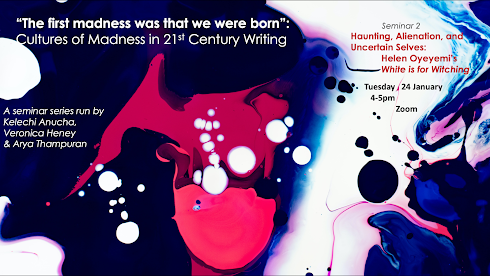A year ago we were sat
in a Durham coffee shop, idly chatting about novels we loved, novels we were
writing about, and novels we wanted to write about and think about more. As we
spoke, it occurred to us that not only were there resonances between our work,
but that the different texts we were interested in often spoke to one another –
that they had connections and contrasts that might be exciting and useful to
explore. In particular we were intrigued in the ways that novels offered the
opportunity for understand madness, mental illness, and mental distress in
different, culturally located ways – for instance, the way that they might
eschew universalising Western medical models for frameworks that accounted for
geographic, historical, and relational specificity or alterity. That is to say,
that perhaps fiction allows us to explore the myriad ways that race, gender,
and sexuality are intertwined with madness in our lives and our societies.
One of the challenges
of academic life is finding the time and the space for thinking, rather than
simply for working – for the tasks that make up so much of our days, for
teaching, for admin, for meetings. Even harder is finding the time and space
for thinking collectively rather than alone – when everyone is so
over-scheduled it can be difficult to get diaries to line up, and to prioritise
the ways that thinking along with one another can challenge, expand, and enrich
our work. As scholars interested in both literature and society we often find
ourselves paying attention to form, to the ways that the conventions or
physical properties of a text can shape its content. Such an awareness invites
attention to the way that the structures of our working life might limit or
allow what we’re able to do. So rather than waiting for thinking or inspiration
to simply manifest, we decided to try and build a structure that might make it
possible.
Over a period of
around 8 months we scheduled 4 seminars through which we might lay out a
programme not of finished work but rather a space for thinking-in-progress.
Focusing on one or two texts per event, we attended to the particular ways that
each text approached madness, the different discourses and frameworks within
which madness was entangled, positioned, and made sense of. Yet as the seminar
series progressed, we were also able to make connections between the texts,
deepening our understanding of broader functions of form, genre, and social
context through their similarities and contrasts. We maintained the same
structure over every event: the three of us each offered a brief provocation of
5-10 minutes exploring a particular aspect of the text, followed by around 30
minutes of general discussion, in which seminar attendees joined us in
exploring what these texts were doing, and what implications they might carry
for our understandings of madness, and how madness is experienced with relation
to race, gender, and sexuality. The series began with Han Kang’s The
Vegetarian, then Helen Oyeyemi’s White is for Witching, followed by
Akwaeke Emezi’s Freshwater, and finally Yrsa Daley-Ward’s The
Terrible together with I want to die but I want to eat Tteokbokki by
Baek Sehee. We considered themes of alienation, haunting, re-storying,
embodiment, and transformation – among many others!
Credit: The blog was contributed by Veronica Heney

Comments
Post a Comment